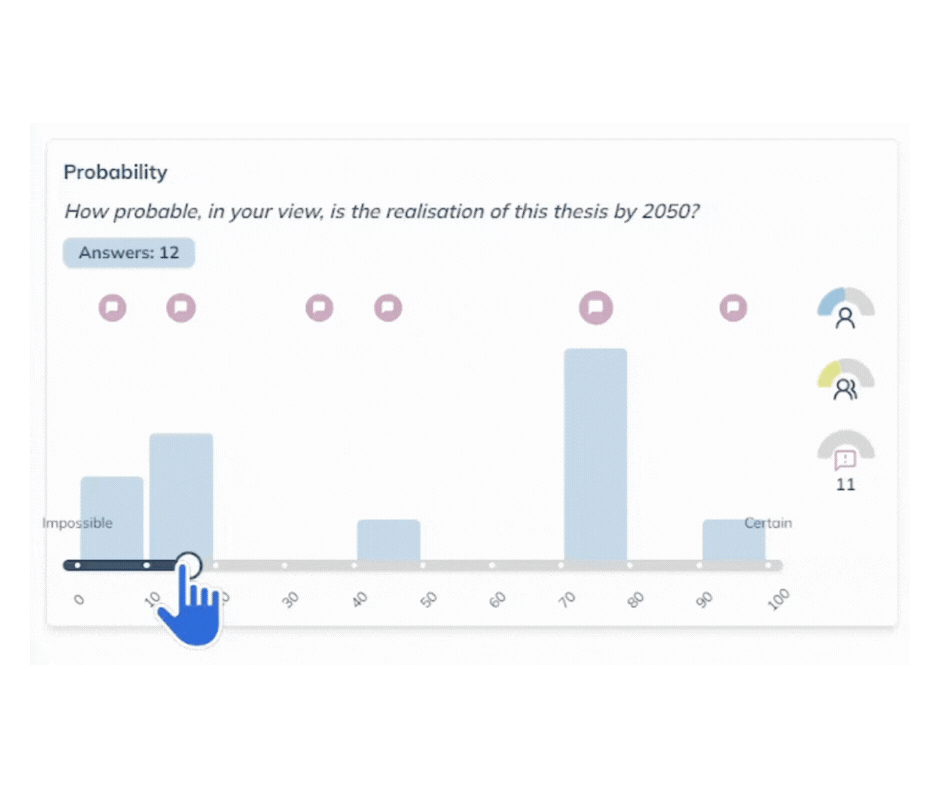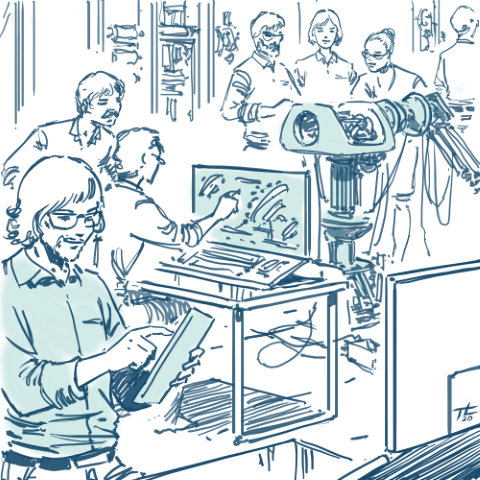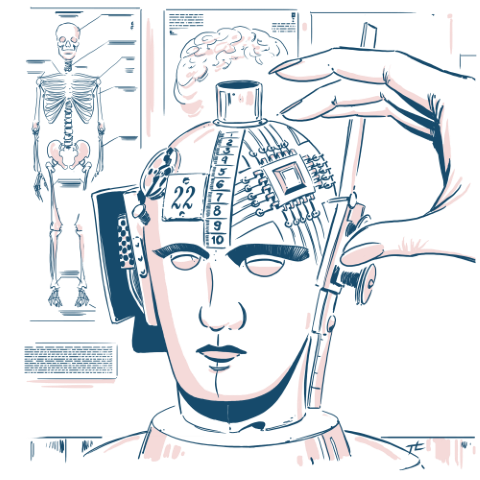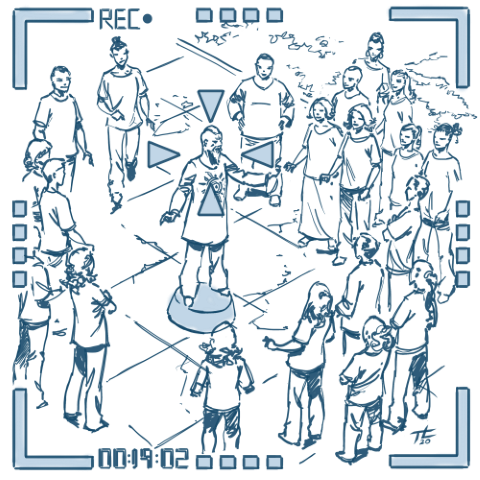Delphi died?
Far from it, but your platform might be stuck in the past

From shaping effective government policies, informing medical research and driving successful business strategies, the power of collective intelligence has become indispensable. Real-Time Delphi (RTD) is a well-established and proven method, trusted for years across the world in thousands of applications – from clinical trials in medicine to research initiatives, private sector innovations, and guiding global strategies. Delphi harnesses collective intelligence, fostering collaboration and generating valuable insights for true understanding and data-driven decision-making.
However, despite its proven value, the way both round-based and real-time Delphis are often implemented fails to unlock its full potential. The true promise of Delphi – achieving reasoned, robust consensus built on shared understanding – is frequently hampered by the very tools designed to facilitate it. To move beyond superficial agreement and harness the method’s full power, the platform supporting it must actively cultivate deep understanding, spark genuine inspiration from diverse viewpoints, and encourage thoughtful opinion evolution based on shared reasoning.

The essence of Delphi: Learning from each other
An effective Delphi process transcends the mere collection of scores and calculation of averages. Its core value lies in facilitating a structured, reflective dialogue where participants can truly engage with the collective intelligence:
![]() See diverse perspectives: Participants need to grasp the full spectrum of opinions, not just the central point.
See diverse perspectives: Participants need to grasp the full spectrum of opinions, not just the central point.
![]() Understand the reasoning: Critically, they must be able to easily explore why others hold different views, primarily through access to qualitative justifications supporting assessments from a certain range. This context is essential.
Understand the reasoning: Critically, they must be able to easily explore why others hold different views, primarily through access to qualitative justifications supporting assessments from a certain range. This context is essential.
![]() Reflect and re-evaluate: The process must encourage participants to thoughtfully consider peer insights, allowing for genuine shifts in perspective based on exposure to new arguments and evidence, rather than pressure to conform.
Reflect and re-evaluate: The process must encourage participants to thoughtfully consider peer insights, allowing for genuine shifts in perspective based on exposure to new arguments and evidence, rather than pressure to conform.
![]() Converge towards informed consensus: The goal is robust agreement built upon shared understanding and the integration of diverse rationales, not just statistical convergence around a mean.
Converge towards informed consensus: The goal is robust agreement built upon shared understanding and the integration of diverse rationales, not just statistical convergence around a mean.
A truly effective Delphi empowers participants to learn from the collective wisdom, be inspired by novel arguments, and refine their views accordingly. This requires active, facilitated understanding, not just passive data presentation.

The pitfall of superficial convergence: Why outlier visibility matters
Many Delphi implementations, whether traditional multi-round (MRD) or modern RTD, inadvertently steer participants towards statistical convergence, often emphasizing the majority view. While it’s often true that the majority perspective holds significant weight or is ultimately correct, a platform designed only to support and reinforce this majority view fails miserably at facilitating a true Delphi process. The core value of Delphi lies in exploring the full spectrum of reasoned opinions.
An overemphasis on statistical convergence creates pressure for individuals to align with the majority, even if their dissenting perspectives are rooted in unique insights or critical information. Critically, valuable outlier viewpoints must at least stand a chance; they should be visible enough for others to see, consider, and potentially integrate into their own understanding. However, in most existing platforms and delphi-method implementations, these perspectives are often lost from the very start – buried in unsorted comment lists or obscured by statistical summaries. Consequently, potentially crucial arguments that could challenge assumptions, refine collective understanding, and lead to a more robust outcome are marginalized by default. The result is often an “illusion of insight” – a consensus that appears data-driven but lacks the depth and validity that comes from genuine, shared understanding and the thoughtful consideration of all reasoned arguments, not just the most popular ones.

Outdated tools, missed opportunities: The Delphi platform gap
Unfortunately, the vast majority of platforms used for Delphi studies, including many RTD systems, fail to facilitate this deep level of interaction, even when they move beyond simple averages. Their shortcomings often include:
![]() Clunky implementations of visual data: Some platforms show histograms or distributions, which is an improvement over a single average. However, the implementation is often clunky. It remains difficult to intuitively connect specific parts of the distribution to the underlying justifications or comments provided by participants holding those views. The focus stays heavily numbers-driven.
Clunky implementations of visual data: Some platforms show histograms or distributions, which is an improvement over a single average. However, the implementation is often clunky. It remains difficult to intuitively connect specific parts of the distribution to the underlying justifications or comments provided by participants holding those views. The focus stays heavily numbers-driven.
![]() Difficulty accessing justifications: The crucial step of understanding why someone holds a particular assessment is frequently hindered. Platforms may present comments in long, unsorted lists, making it arduous to find relevant arguments or link them to specific ratings, not to mention being able to see comments supporting a particular range of assessments. While theoretically possible to analyze all comments one by one, the time, effort, and motivation required to do this thoroughly for each assessment means hardly anyone actually does it in practice. The insight remains buried.
Difficulty accessing justifications: The crucial step of understanding why someone holds a particular assessment is frequently hindered. Platforms may present comments in long, unsorted lists, making it arduous to find relevant arguments or link them to specific ratings, not to mention being able to see comments supporting a particular range of assessments. While theoretically possible to analyze all comments one by one, the time, effort, and motivation required to do this thoroughly for each assessment means hardly anyone actually does it in practice. The insight remains buried.
![]() Lack of context and guidance: Participants often struggle to see precisely where their opinion differs significantly from the group or specific subgroups. There’s typically no intelligent guidance highlighting areas demanding attention – such as points of high disagreement, new arguments, or where their own view is an outlier.
Lack of context and guidance: Participants often struggle to see precisely where their opinion differs significantly from the group or specific subgroups. There’s typically no intelligent guidance highlighting areas demanding attention – such as points of high disagreement, new arguments, or where their own view is an outlier.
![]() Impediments to interaction and learning: Engaging in a focused discussion around specific comments or arguments is often impossible. Furthermore, the common practice in many platforms where changing a justification simply overwrites the previous comment destroys the conversational thread. This prevents meaningful discussion (like replying to or building upon prior statements) and makes it impossible to rate or react to specific arguments as they evolve. This fundamentally hinders collective reasoning, obscures the dynamic nature of argumentation, and prevents participants from effectively learning from each other and refining views together based on an evolving dialogue. Witnessing how arguments impact others – seeing opinions change in response to specific justifications – is also not facilitated, obscuring the dynamic learning process.
Impediments to interaction and learning: Engaging in a focused discussion around specific comments or arguments is often impossible. Furthermore, the common practice in many platforms where changing a justification simply overwrites the previous comment destroys the conversational thread. This prevents meaningful discussion (like replying to or building upon prior statements) and makes it impossible to rate or react to specific arguments as they evolve. This fundamentally hinders collective reasoning, obscures the dynamic nature of argumentation, and prevents participants from effectively learning from each other and refining views together based on an evolving dialogue. Witnessing how arguments impact others – seeing opinions change in response to specific justifications – is also not facilitated, obscuring the dynamic learning process.
![]() High effort barrier: Even if some advanced features exist in some platforms, they often require specific knowledge and significant user effort due to non-intuitive design. This high cognitive load means that, in practice, many participants do not or cannot leverage these features effectively, defaulting to a superficial engagement with the presented numbers.
High effort barrier: Even if some advanced features exist in some platforms, they often require specific knowledge and significant user effort due to non-intuitive design. This high cognitive load means that, in practice, many participants do not or cannot leverage these features effectively, defaulting to a superficial engagement with the presented numbers.
When a platform fails to make the exploration of reasoning intuitive and effortless, relying instead on outdated design philosophies and placing the burden of synthesis entirely on the user, the Delphi exercise becomes a shadow of what it could be. It remains a static data-gathering task rather than a dynamic process of shared learning, mutual inspiration, and collaborative view refinement.

Real-Time Delphi (RTD): Speed meets the need for better tools
Real-Time Delphi inherently offers advantages over traditional MRD, primarily through immediate feedback, which enables faster iteration, increased engagement, and potentially reduced dropout rates. Participants see group responses dynamically, allowing for significant opinion shifts when individuals are persuaded by emerging arguments.
However, the speed of RTD only highlights the urgent need for better tools. An RTD platform can still perpetuate the “illusion of insight” if its primary focus remains on real-time statistics – even sophisticated ones – without making it fundamentally easier for participants to access, explore, interact with, and be inspired by the reasoning behind those statistics.

Designing for understanding: The path to truly insightful Delphi
To move beyond superficial consensus and realize the full potential of the proven Delphi method, platform design is paramount. The focus must shift from merely presenting data to actively facilitating understanding and inspiration through modern UX. Effective platforms should be architected around the principle that exploring diverse perspectives and their underlying rationale should be effortless and central to the experience. Key design elements include:
![]() Context beyond averages: Displaying the full distribution of peer responses alongside an individual’s assessment provides immediate, intuitive context.
Context beyond averages: Displaying the full distribution of peer responses alongside an individual’s assessment provides immediate, intuitive context.
![]() Intelligent guidance: Using visual cues to guide attention towards areas of significant disagreement, differing views, or new justifications prompts reflection where needed.
Intelligent guidance: Using visual cues to guide attention towards areas of significant disagreement, differing views, or new justifications prompts reflection where needed.
![]() Effortless exploration of reasoning: Enabling users to easily filter, sort, and access comments linked to specific viewpoints dramatically lowers the barrier to understanding the ‘why’.
Effortless exploration of reasoning: Enabling users to easily filter, sort, and access comments linked to specific viewpoints dramatically lowers the barrier to understanding the ‘why’.
![]() Visible learning and interaction: Showing how arguments influence peers and facilitating discussion makes the learning dynamic visible and encourages engagement.
Visible learning and interaction: Showing how arguments influence peers and facilitating discussion makes the learning dynamic visible and encourages engagement.
![]() Intuitive user experience: Integrating these features seamlessly into an engaging, modern, and easy-to-use interface minimizes cognitive load and encourages deeper participation.
Intuitive user experience: Integrating these features seamlessly into an engaging, modern, and easy-to-use interface minimizes cognitive load and encourages deeper participation.

Moving forward: Expecting more from Delphi platforms
Achieving meaningful consensus and unlocking genuine collective intelligence requires more than statistical summaries and reliance on outdated design philosophies. It demands a commitment to fostering deep understanding and facilitating effortless inspiration through platforms meticulously designed using modern UX principles.
While RTD offers advantages in speed and engagement, it is the integration of features that actively facilitate understanding – making the exploration of reasoning intuitive, guiding attention effectively, and revealing the dynamics of learning – that transforms it from merely efficient to truly insightful. Platforms engineered around this principle move beyond the limitations of decades-old designs and the superficiality of statistics-focused approaches. By putting understanding and inspiration at the core through intelligent, user-centered design, such platforms finally allow the well-proven Delphi method to deliver fully on its promise: harnessing collective intelligence to effectively navigate complexity and drive truly informed decisions.

Bridging the gap: The emergence of next-generation Delphi
Recognizing the gap between Delphi’s potential and the limitations of existing tools, a new generation of platforms is emerging. 4CF Halnyx 2.0 represents such an effort, developed from the ground up by seasoned Delphi methodologists and practitioners aiming specifically to address the shortcomings discussed. Its design philosophy centers on making the exploration of diverse reasoning effortless, guiding participant attention intelligently, and fostering genuine interaction to unlock deeper insights and more robust consensus. For researchers and organizations seeking to elevate their use of the Delphi method beyond conventional constraints and truly harness collective intelligence for today’s complex challenges, exploring solutions like Halnyx 2.0 may offer a valuable path forward to experience the difference firsthand.

Experience the next generation of Delphi
4CF Halnyx 2.0 provides the intuitive, powerful, and insight-focused platform needed to conduct effective Real-Time Delphi studies that deliver meaningful results.
Interested in Delphi and RTD? Explore our expert series:
4CF Delphi Expert Series offers comprehensive insights, drawing on extensive experience, covering everything from the fundamentals to advanced applications and the crucial role of next-generation platforms. Whether you're new to Delphi or an experienced practitioner, explore these articles to deepen your knowledge and enhance your results.






Explored these? Discover even more in our full Delphi series
Interested in Delphi and RTD? Explore our expert series:
4CF Delphi Expert Series offers comprehensive insights, drawing on extensive experience, covering everything from the fundamentals to advanced applications and the crucial role of next-generation platforms. Whether you're new to Delphi or an experienced practitioner, explore these articles to deepen your knowledge and enhance your results.
Explored these? Discover even more in our full Delphi series
Stay updated! Subscribe to our newsletter:
By subscribing to our newsletter, you consent to the processing of the provided data. The data controller is 4CF Sp. z o.o., its registered office is located in Warsaw, 10/14 Trzech Krzyży Square, postal code: 00-499.
We process your data solely for the purpose of sending information about 4CF Sp. z o.o. and its activities via e-mail. Your data will be processed until your consent is revoked through a link that will be included in each newsletter. The withdrawal of consent shall not affect the lawfulness of processing based on consent before its withdrawal. Providing your data is voluntary, but necessary if you wish to receive information about 4CF Sp. z o.o. and its activities. We may transfer the data to our suppliers of services related to the processing of personal data, e.g. IT service providers. Such entities process data on the basis of a contract with our company and only in accordance with our instructions. You have the right to request access to your personal data, its rectification, deletion or limitation of processing, as well as the right to lodge a complaint with the supervisory authority. More information about your rights and about the processing of your personal data can be found in our privacy policy.







